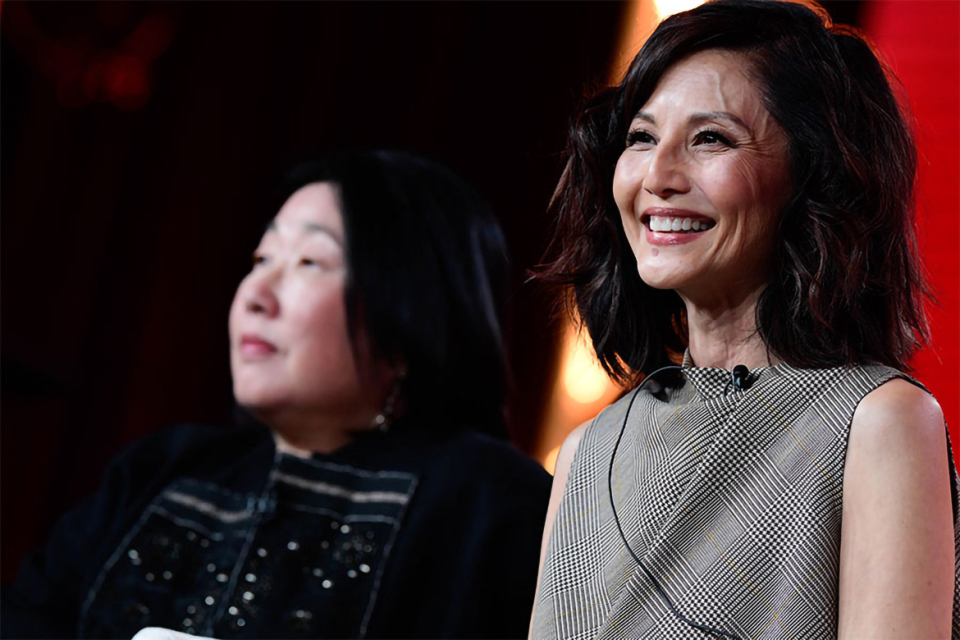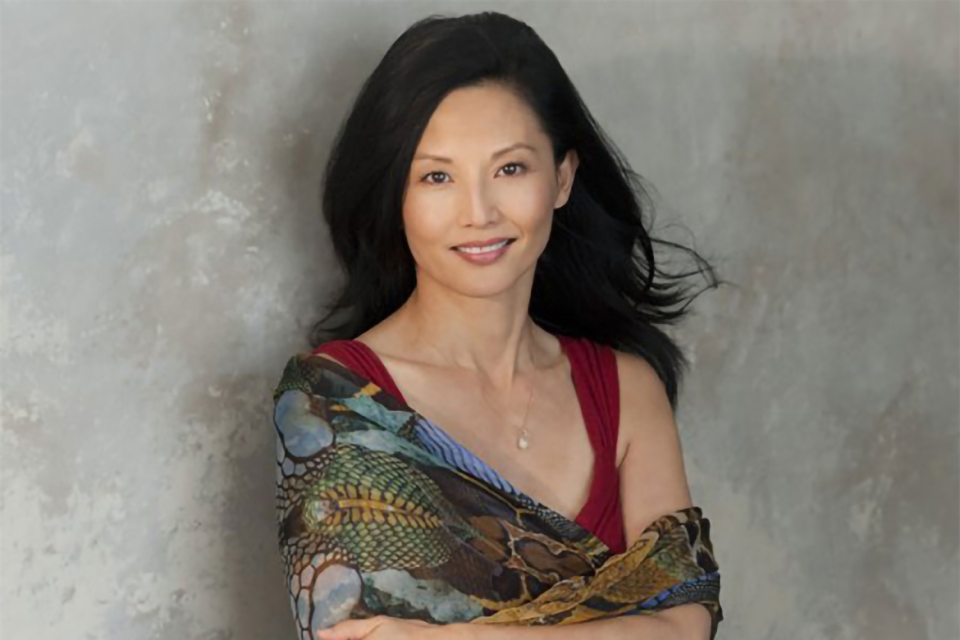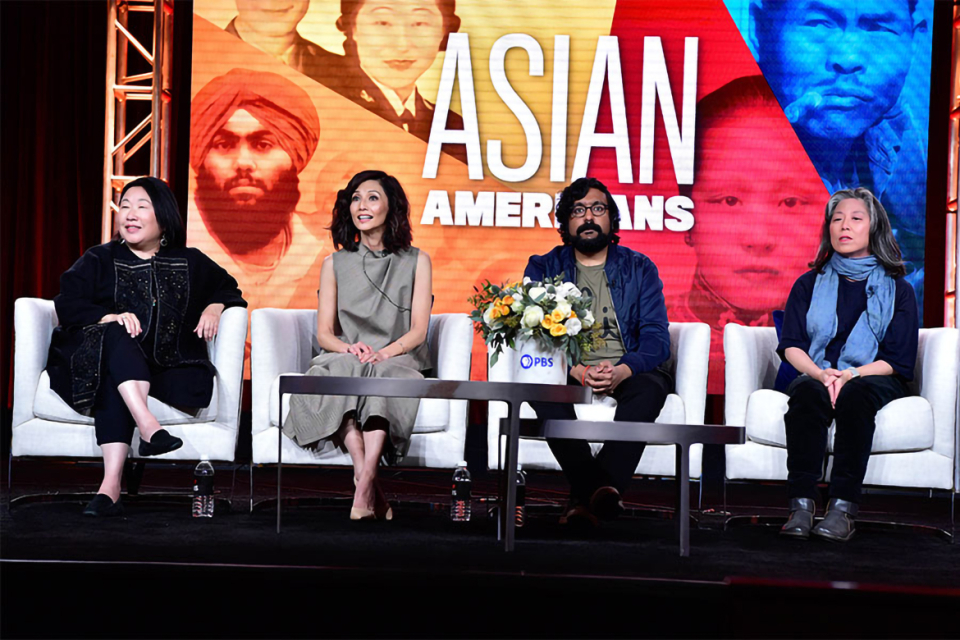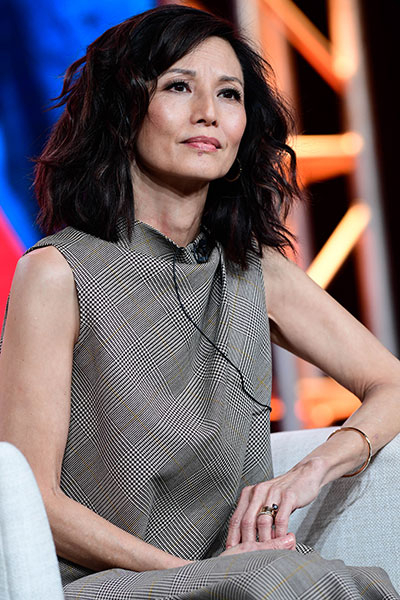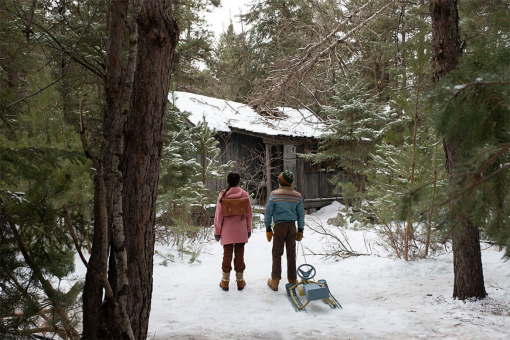Tamlyn Tomita hopes to foster cultural understanding with PBS's upcoming documentary series Asian Americans, which she narrates alongside Daniel Dae Kim, a South Korea-born actor who has starred in Lost, 24 and Hawaii Five-0. The series will air May 11-12 as a tie-in to Asian Pacific Heritage Month.
The five-part documentary, according to promotional materials, "delivers a fresh perspective on a history that matters today, more than ever. As America becomes more diverse, and more divided while facing unimaginable challenges, how do we move forward together?
"Told through intimate personal stories, the series will cast a new lens on U.S. history and the ongoing role that Asian Americans have played."
The series chronicles the contributions and challenges of Asian Americans, who are the fastest-growing ethnic group in America, through personal histories and new academic research into the impacts Asian Americans have had on American history, from the first wave of Asian immigrants in the 1850s to today.
The series follows The Jewish Americans, The Italian Americans and Latino Americans, which were previously produced for PBS by WETA, a public broadcasting company serving Virginia, Maryland, and the District of Columbia.
It is accompanied by "robust educational, engagement, and digital components" in partnership with Asian Americans Advancing Justice of Los Angeles, according to a release.
Tomita said she heard about the project in January 2019, and she was "overjoyed" that summer when she was asked to narrate.
Tomita was born in Japan, but that doesn't stop people from assuming her mother has something to do with COVID-19.
"People back away from my mother because she still speaks with an accent. They just assume she's Chinese," Tomita - who got her acting break in Karate Kid Part II in 1986 and has since had starring roles in Joy Luck Club, The Day After Tomorrow, JAG, Law & Order and, most recently, as Commander Oh in Star Trek: Picard and as Allegra Aoki in The Good Doctor - said during a recent interview.
It infuriates her that people lump all Asian Americans into a single group, she said. It also makes her mad that people are looking for someone to blame for the coronavirus.
"It's not about China. It's about this virus," she said. "We have to assemble the most brilliant scientific minds in the world to get rid of it, to rush to find a vaccine, to rush to find a cure ... so when we encounter the next one - and there's going to be a next one - we can all react in a positive, collaborative way.
"How does suing a country help the citizens of the world to combat this virus together?" she asked. "When I see a sign that says go back to China, I say I'll go back to my country - here, which is alongside you. It's not helpful to hurl insults."
Besides her own struggles confronting Asian-American stereotypes, Tomita grew up with a personal history that has shadowed her life and career. Her Japanese-American father was interned at the Manzanar concentration camp in California during World War II.
"It's created a legacy for my entire family," Tomita said. "We have a responsibility to keep that story alive, and to make sure it doesn't happen to another group of people here in the United States or, really, anywhere in the world."
Internment of any group of people for reasons of their ethnicity or religion "is an injustice for all," she said.
Tomita has logged an impressive list of film and television credits over the past 30 years, but she said she often has found herself pigeonholed in certain types of roles because of her Asian appearance as much as her age or gender.
"I see the doors of opportunity slowly opening," she said. "But we are still saddled with perceptions of Asians and Asian Americans that are based in stereotypes, or are based in racist depictions of Asians."
She credits a "huge tsunami, and yes, the pun is intended," of successful Asian movies and television, from Jon M. Chu's Crazy Rich Asians to Alice Wu's The Half of It with helping to open those doors and promote her peers simply as actors and directors, rather than Asian actors and directors.
It's a far cry from the old days of Charlie Chan movies, most of which starred a white actor in yellowface and portrayed the detective - originally conceived, Tomita said, as a "kickass, bad ass Chinese American" - as a stereotypical Asian "who speaks in fortune cookies."
Of course, she said, many Americans don't differentiate between Asian nationalities.
"It's easy to compartmentalize," she said. "It's easy to lump all Asian Americans in one group, but we're as different as Italian Americans are from Austrian Americans or Australian Americans.
"It's double frustrating, but it's exciting to see how varied and multicolored our fabric as Asian Americans can be."
Tomita, who advocates for inclusion and diversity in the film industry, hopes that people who watch the series will learn that their neighbors "are carriers of wonderful stories."
"It makes us more relatable, more recognizable," she said. "Non-Asian Americans can see these Asian-American stories and claim them as their own, because they're American stories."
Whether it's a Chinese immigrant who worked on the transcontinental railroad or a Japanese American who served in the U.S. military during World War II, the series shares "stories of how people persisted," Tomita said.
"Despite some tragic stories, people still believed in this idea of America. It never brought them down. And being American, living in America, is the greatest thing anyone could ever fight for."
"We are here," she added. "We're in this together."
The COVID-19 pandemic has opened the floodgates to a lot of cultural insensitivity and hatred that, previously, was hidden away, she said.
"When you see these vicious, mean, ugly racist insults hurled at Asian Americans - oh my gosh, it's just so upsetting," she said. "People are fearful, and they're falling back on racist attitudes and prejudices."
Racial hatred "is easy," she said, because "it's a convenient way to get rid of your fear, by hurling hate."
"But it's uncivil. And it's inhumane," she added. "It's not forward, progressive thinking. It doesn't help individuals, it doesn't help the community. It doesn't help the nation."
The push by some to label COVID-19 "the China virus" is ironic, she said, given that the Spanish flu may have originated in Kansas, but most certainly didn't come from Spain.
The current political and social climates make the PBS series particularly timely, Tomita said.
"This is a perfect time to show Asian American stories, because they really are American stories," she said. "Any American of any background, of any creed or nationality, can look at these stories and see someone trying to make it in the United States. It becomes universal."
The stories highlighted in the series "really do speak to each family, each individual, each community," Tomita said. "We're all trying to do the best we can to pursue this American notion of life, liberty and happiness.
"We're here in the greatest country in the world, all trying to find a better life than the country we came from. And we can all do that as a community."
It's OK, she said, to be proud of where you are and where you're from.
"I'm a Valley girl," she said with a laugh. "I'm as proud of being from the San Fernando Valley as I am of my heritage from Okinawa, Japan and the Philippines."

